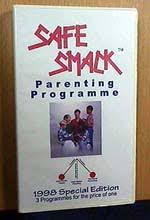Some ideas fail because they are too far ahead of their time. In the case of Safe Smack, you could say that it failed because it was literally too far behind.
Safe Smack was a ‘parenting programme’ launched in 1997. It was pro-spanking and, as the name suggests, had the aim of promoting safer corporal punishment. The programme was to be sold as a package of a VHS video, possibly one or two books (my sources differ on this point) – and, most controversially, a 9in-long red leather strap, which was to be used to administer the punishment to your children.

Like Clyde Bullock’s The Rod, Safe Smack was the idea of someone you might term as an enthusiastic amateur, in this case insurance broker Philip Holdway-Davis, of Auckland, New Zealand. Holdway-Davis, who was 37 at the time, had reportedly invested £12,000 of his own money in the Safe Smack project, to be sold by mail order.
The strap included was dubbed the Uncle Sam Smacker. Holdway-Davis told the BBC in an interview: “It’s a very light instrument and it’s only [to be used] in certain circumstances. Because it’s so controlled, so well worked out, parents aren’t in danger of abusing their children.”
The accompanying video explained more fully how the strap was to be used, and recommended that a child of seven could be smacked up to 30 times a day. It did, however, recommend that physical punishment should be used only as a last resort and that the smackings should be ‘delivered with affection’.
One scene in the video apparently showed a child about to be smacked by his parents, a serious-looking mum holding his hands down in order to bend him over, while dad stands ready with the strap at what you might call the business end. The actual administration, however, is shown using a child-size mannequin.
As I mentioned, some of my sources claim there was also an accompanying book, or possibly even two, one for parents and one aimed at children, which had illustrations of an anthropomorphic Uncle Sam Smacker (“Hi, I’m Uncle Sam Smack and I’ve given lots of smacks in my time”), presumably to help parents explain the nature of the punishment and the reasons for its necessity. However, a BBC report on the row (one of the few in existence online) only mentions the video and strap.
Where Holdway-Davis possibly made a big mistake was that instead of getting on with the Safe Smack programme and quietly selling it via mail order through sympathetic outlets (as Bullock did with The Rod), he enthusiastically sent samples of the programme to the British press – an institution not renowned for its restraint whenever there is the opportunity to stir up foment.
The newspapers promptly contacted ‘child care experts’ for their views on Safe Smack (no prizes for guessing what they said) as well as a raft of MPs. Soon, Safe Smack was all over the headlines for all the wrong reasons.
Robin Corbett, then Labour MP for Birmingham Erdington, called for Safe Smack to be banned, adding: “This is a dangerous sickness. It runs the very real risk of encouraging child abuse.”
The UK’s National Society for the Prevention of Cruelty to Children (NSPCC) also weighed in on the row. Chief executive Jim Harding said: “The NSPCC condemns the use of implements in any punishment of children. Physical harm can be caused and such punishments only legitimise violence against children as acceptable behaviour.”
It’s interesting to note how Harding limits his criticism to the practice of using an implement – the NSPCC had not at that time gone totally ‘hard line’ against the occasional smack from parents.
As with The Rod, the backlash began to build and finally killed off Safe Smack, which was basically dead in the water before it had even started. Holdway-Davis initially announced that he was delaying the introduction of the programme to allow him to consult further with child care experts, then some time later said he was dropping the idea altogether – quite possibly with one eye firmly on how the controversy might be affecting his mainstream business and primary source of income.
And that was the end of the story. Uncle Sam Smack never got to chastise the bottoms of the UK’s naughty children and Holdway-Davis went back to selling insurance, which he apparently still does today, along with the odd foray into writing about military history.
He is not entirely forgotten, however. His home country banned smacking entirely in 2007 and Safe Smack is recalled as a milestone in the booklet Unreasonable Force – New Zealand’s journey in banning the physical punishment of children, published by the charity Save The Children.
The story of Safe Smack has many parallels with that of The Rod, not least for the way in which it points up a rather singular dichotomy among parental attitudes to corporal punishment.
In a world where emotions and feelings regularly trump rational thought, many adults are still comfortable with the idea of occasionally letting off parental steam through the medium of a firm smack to their child’s behind. However, any suggestion that they should actually plan for the moment of discipline, let alone keep a specific implement for the task, is apparently anathema to the majority.